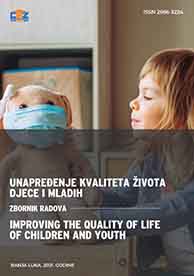SKLONOST AKADEMSKOM VARANJU STUDENATA FAKULTETA ZDRAVSTVENIH STUDIJA SVEUČILIŠTA U MOSTARU
PREFERENCE TO ACADEMIC CHEATING OF STUDENTS OF THE FACULTY OF HEALTH STUDIES, UNIVERSITY OF MOSTAR
Author(s): Ivona Ljevak, Ana Mišković, Marko RomićSubject(s): Education, Evaluation research, Social Norms / Social Control
Published by: CENTAR MODERNIH ZNANJA
Keywords: cheating; students; education;
Summary/Abstract: Introduction: Academic integrity is a fundamental commitment that everyone, both professors and students, should support at all levels, in order to instill in the future workforce the value of professional integrity. Studies show that between half and two-thirds of students cheat at least once during their studies. It is considered to be the most serious form of cheating, in fact cheating on the knowledge exam, which may include transcribing answers from another student, using slander and helping another student to cheat on the exam. Aim of the research: The aim of this research is to examine the propensity of academic cheating of undergraduate students of the Faculty of Health Studies, University of Mostar and the willingness to involve other persons in the commission of academic dishonesty. Methods and respondents: The study included 257 students of the Faculty of Health Studies, University of Mostar. Out of that number, 89 subjects of Radiological Technology, 122 subjects of Physiotherapy and 46 subjects of Sanitary Engineering. The survey is anonymous and was conducted through Google Forms, which is an integral part of Google Drive (Google Drive) in the period from September 1, 2020 to September 10, 2020.Results: The research found that students mostly ask for services from relatives, friends, and colleagues they know superficially, while from colleagues they do not know, most students would no task for these services. The survey found that a higher percentage of male students are willing to academically cheat than the percentage of women. The results show a statistically significant difference in academic cheating between 1st and 3rd year students. Conclusion: The research found that students are ready for academic cheating, and the involvement of others in the execution of the same. Preventive measures need to be introduced, such as the introduction of stricter penalties, ethics courses, the application of codes of conduct, and the education of pupils and students on cheating and plagiarism through workshops or other means. An important role is also played by professors who need to be aware that by fostering student integrity they raise the level of awareness in students about the bad impact of academic cheating in their future.
Journal: DRUŠTVENE DEVIJACIJE
- Issue Year: VI/2021
- Issue No: 6
- Page Range: 109-116
- Page Count: 8
- Language: Bosnian, Croatian, Serbian

